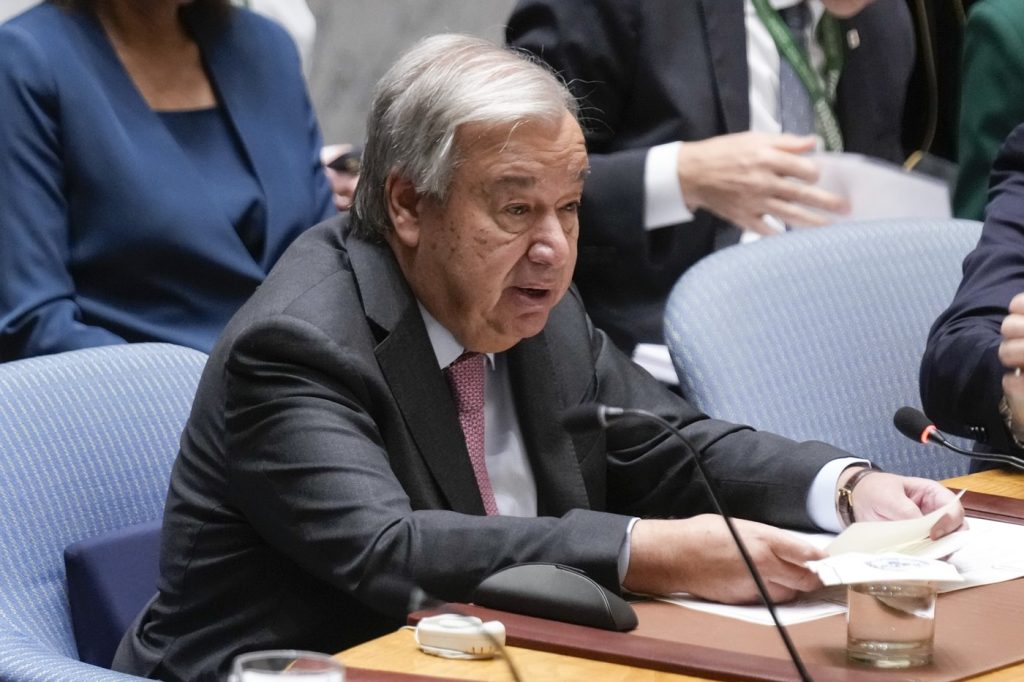War affects over 600 million women and girls, UN says

UNITED NATIONS (AP) — More than 600 million women and girls are now affected by war, a 50% increase from a decade ago, and they fear the world has forgotten them amid an escalating backlash against women’s rights and gender equality, top U.N. officials say.
U.N. Secretary-General Antonio Guterres said in a new report that amid record levels of armed conflict and violence, progress over the decades for women is vanishing and “generational gains in women’s rights hang in the balance around the world.”
The U.N. chief was assessing the state of a Security Council resolution adopted on Oct. 31, 2000, that demanded equal participation for women in peace negotiations, a goal that remains as distant as gender equality.
Advertisement
Guterres said current data and findings show that “the transformative potential of women’s leadership and inclusion in the pursuit of peace” is being undercut — with power and decision-making on peace and security matters overwhelmingly in the hands of men.
“As long as oppressive patriarchal social structures and gender biases hold back half our societies, peace will remain elusive,” he warned.
The report says the proportion of women killed in armed conflicts doubled in 2023 compared with a year earlier; U.N.-verified cases of conflict-related sexual violence were 50% higher; and the number of girls affected by grave violations in conflicts increased by 35%.
At a two-day U.N. Security Council meeting on the topic that ended Friday, Sima Bahous, head of the U.N. agency promoting gender equality known as UN Women, also pointed to a lack of attention to women’s voices in the search for peace.
She cited the fears of millions of women and girls in Afghanistan deprived of an education and a future; of displaced women in Gaza “waiting for death”; of women in Sudan who are victims of sexual violence; and of the vanishing hopes of women in Myanmar, Haiti, Congo, the Sahel region of Africa, South Sudan, Syria, Ukraine, Yemen and elsewhere.
Advertisement
Bahous said 612 million women and girls who are affected by war “wonder if the world has already forgotten them, if they have fallen from the agenda of an international community overwhelmed by crises of ever deeper frequency, severity and urgency.”
The world needs to answer their fears with hope, she said, but the reality is grim: “One in two women and girls in conflict-affected settings are facing moderate to severe food insecurity, 61% of all maternal mortality is concentrated in 35 conflict-affected countries.”
As for women’s participation in decision-making and politics in countries in conflict, Bahous said it’s stalled.
“The percentage of women in peace negotiations has not improved over the last decade: under 10% on average in all processes, and under 20% in processes led or supported by the United Nations,” she said.
U.N. Deputy Secretary-General Amina Mohammed announced the launch of a “Common Pledge on Women’s Participation in Peace Processes,” and urged governments, regional organizations and others involved in mediation to join the U.N. in taking concrete steps toward that end. The commitments include appointing women as lead mediators and team members, promoting direct and meaningful participation of women in peace processes, consulting women leaders at all stages and embedding women with expertise “to foster gender-responsive peace processes and agreements,” she said.
Advertisement
Many U.N. ambassadors who spoke at the council meeting focused on the lack of “political will” to promote women in the peace process.
“We’ve seen how the lack of political will continues to stand in the way of the full implementation of the commitments entered into by member states,” Panama’s U.N. Ambassador Eloy Alfaro de Alba said Friday.
Edith M. Lederer, The Associated Press